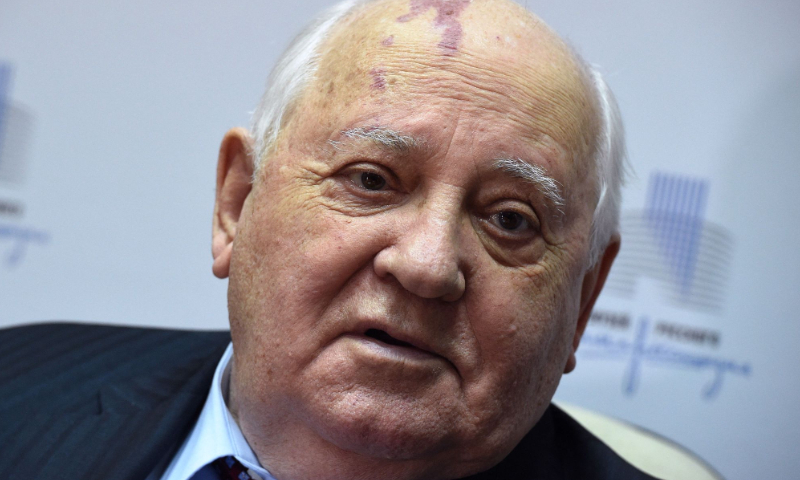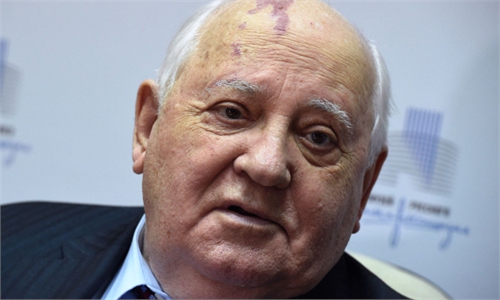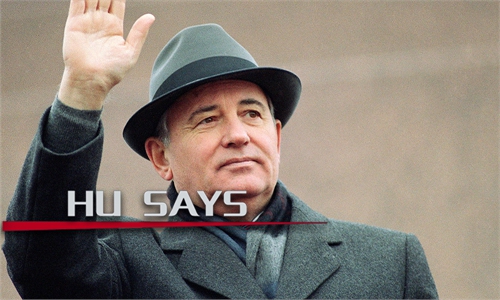Gorbachev won Western acclaim by betraying USSR

Mikhail Gorbachev File Photo: VCG
Mikhail Gorbachev, the last leader of the former Soviet Union, passed away on Tuesday local time. Russian President Vladimir Putin expressed his condolences. But the real and overwhelming compliments for him came from the West, ranging from US President Joe Biden to British Prime Minister Boris Johnson and politicians from the same era of Gorbachev, who praised him for introducing "brave democratic reforms," bringing "freedom," ending the Cold War and making the world safer.
It can be argued that Gorbachev was one of the most controversial world leaders. He won the widespread acclaim from the West by sacrificing the interests of his homeland. Because of him, the West became more secure. But the aftermath of the fall of the former Soviet Union has led to a series of wars on that land, first in Chechnya, then in Georgia, and now in Ukraine where the most brutal war since the end of World War II in Europe is taking place.
Gorbachev became leader of the Soviet Union in 1985 when he was only 54 years old. He had an ambition to end the Soviet Union's economic and social stagnation through reforms. However, he had some political idealism and naivety - which are common among some intellectuals - seriously underestimating the complexity, risks and challenges of reforms in a multi-ethnic country, and lacking control over the reform process.
Under Gorbachev's leadership, the reforms of the Soviet Union started from the political field, aggressively promoting "new thinking," and continuously transferring the power of the party to the Congress of People's Deputies of the Soviet Union. A few years after he came to power, the country started to fall into chaos.
As the leadership of the party and the authority of the Communist Party of the Soviet Union Central Committee were weakened, narrow-minded nationalism spread rapidly in the Baltic countries and the Caucasus. The first secretaries of some of the republics colluded with the separatist forces and sought independence. Some did not listen to the central command, provoking "territorial disputes" and armed conflicts among the republics.
The nationalism of those small republics, in turn, stimulated the awakening of Russian nationalism. The combination of nationalism and democratization in various places resonated, and finally led to the three major republics - Russia, Ukraine and Belarus - proclaiming the establishment of the "Commonwealth of Independent States," and the Soviet Union came to an end. Gorbachev was deposed.
Russia is the largest successor state of the Soviet Union. Its population is nearly half of that of the USSR, and its national strength dropped dramatically. Russian society is "freer" than Soviet society. With multi-party elections, it wanted to integrate into the Western camp and once became a member of G8. But it is a nuclear power, thus the US will not let it go. Washington's strategic goal is to continue to weaken it, and NATO's eastward expansion is advancing step by step, all of which eventually led to the outbreak of countermeasures from Russia, which was pushed into a corner.
After Gorbachev's death, many Westerners sang praises for him. Some compared him with Putin, expressing their hatred toward the latter. However, Putin has been embraced and supported by Russian people, reflecting their awakening in the face of the negative strategic consequences of the Soviet Union's disintegration. However, today's Russia is not only weak in national strength, but also no longer has its previous Eastern European allies. It appears to show a lack of strength in response to suppression from the US.
Looking back, the Soviet Union was very powerful with considerable technological innovation capabilities. The first manmade satellite and the first nuclear power plant were born in the Soviet Union. Its problems at the time were weak agriculture and light industry. With what we know today, it should have been easy for the resource-rich Soviet Union to solve these problems. But Gorbachev misjudged the problems, chose the wrong path of reform, and lacked political leadership. He himself was obviously an admirer of Western culture, and he cared about and enjoyed the praises that Western public opinion had given to him at that time. He was largely fooled by the West.
Gorbachev had some good cards, but he played it badly and both the Soviet Union and himself lost everything. Today, Russia has fallen into an unprecedented strategic passivity and difficulty. As the last leader of the Soviet Union, everything he did benefited the West, while most members of the former Soviet Union suffered long-term consequences.
The disintegration of one pole in a bipolar world has driven global strategic changes, and its impact will span centuries, and the feelings and evaluations about it from different countries will vary widely. If people go beyond the perspective that leaders should be responsible for their own countries' interests, the evaluation of Gorbachev throughout human history is likely to be more interesting. However, the perspective from the entire humanity has not yet really been formed, and people often make their point from current political interests. In short, Gorbachev's controversy will continue for a long time.
The author is a commentator with the Global Times. opinion@globaltimes.com.cn



